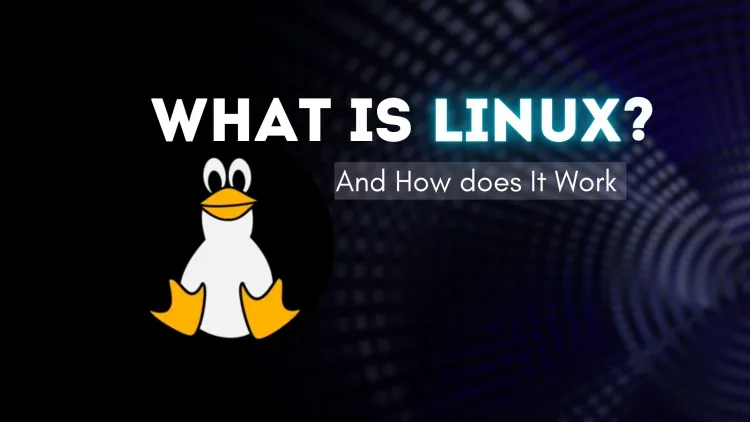Why Linux is the Best Operating System? Key Benefits Explained
Linux offers numerous advantages, making it a top choice for users who value security, stability, performance, and customization. With its open-source nature, free availability, and community support, Linux stands out as a versatile and cost-effective operating system. Whether you're using it on a personal computer, a server, or embedded devices, Linux provides a robust, reliable environment that adapts to your needs.

Linux is one of the most popular and powerful operating systems used worldwide. Known for its security, stability, and flexibility, Linux offers several advantages over other operating systems like Windows and macOS. Whether you're a developer, system administrator, or regular user, Linux has a host of features that make it an ideal choice for various environments. In this blog, we will explore the advantages of using Linux and why it has become the preferred choice for millions of users globally.
1. Open-Source and Free
One of the biggest advantages of Linux is that it is open-source and free to use. Unlike proprietary operating systems that require expensive licenses, Linux allows anyone to download, modify, and redistribute its code without any cost. This makes it an incredibly cost-effective solution for both individuals and businesses.
- Benefits of Open-Source:
- Free to Download: No upfront cost for purchasing the OS.
- Modification Freedom: Users can modify the source code to meet specific needs.
- Community Contribution: An active global community continually improves the system.
2. Security
Linux is widely recognized for its strong security features. Due to its open-source nature, security issues are often quickly discovered and patched by the global community. Linux also has a built-in permission and user access control system, which makes it highly resistant to malware and viruses compared to other operating systems like Windows.
- Key Security Features:
- User Permissions: Fine-grained control over who can access or modify system files.
- Built-in Firewalls: Tools like iptables and ufw provide strong network security.
- Regular Updates: Frequent security patches and updates from the community.
3. Stability and Reliability
Linux is known for its stability and reliability, which is why it is commonly used for servers, mission-critical applications, and embedded systems. Linux systems can run for long periods without requiring a reboot, ensuring that services and applications remain uninterrupted.
- Stability Benefits:
- Minimal Downtime: Linux can run continuously without frequent crashes or errors.
- Uptime Performance: It is ideal for environments that require high availability, like web servers and databases.
4. Customization
One of the major advantages of using Linux is the level of customization it offers. Since Linux is open-source, users have the freedom to modify almost every aspect of the system. You can choose different desktop environments, install only the software you need, and even configure the kernel for specific hardware.
- Customizable Features:
- Desktop Environment: Choose between GNOME, KDE, XFCE, and more.
- Kernel Customization: Tweak the kernel to optimize performance for your hardware.
- Window Managers: Use lightweight window managers like i3 or Openbox for minimal resource usage.
5. Performance
Linux is known for its efficient resource management and high performance, even on older or low-resource hardware. It is highly optimized for both memory and CPU, which allows it to run faster than many other operating systems.
- Performance Advantages:
- Low Resource Usage: Linux uses fewer system resources, allowing it to run smoothly on older hardware.
- Faster Boot Times: Linux typically boots faster than other operating systems.
- Efficient Memory Usage: The system efficiently manages memory, reducing lag and improving performance.
6. Compatibility with Older Hardware
Unlike many modern operating systems, Linux can run efficiently on older hardware with limited resources. This is particularly useful for extending the life of older computers or repurposing old machines for new tasks. Linux can run on devices with lower system requirements, such as those with limited RAM or slower processors.
- Benefits for Older Hardware:
- Lightweight Distributions: Distributions like Lubuntu, Xubuntu, and Puppy Linux are specifically designed to run on older machines.
- Extended Lifespan: Breath new life into old hardware by installing a lightweight Linux distribution.
7. Software and Package Management
Linux uses package managers to install, update, and remove software. These tools make it easy to manage applications and ensure that they are up to date. Unlike other operating systems that may require manual installation or rely on proprietary stores, Linux offers a centralized and efficient way to handle software.
- Package Management Systems:
- APT (Debian/Ubuntu): Handles packages with
.debextensions. - YUM/DNF (RedHat/CentOS/Fedora): Handles packages with
.rpmextensions. - Snap and Flatpak: These allow you to install applications on multiple distributions with ease.
- APT (Debian/Ubuntu): Handles packages with
8. Multi-User Capability
Linux is designed as a multi-user system, meaning that multiple users can access and use the system simultaneously without interfering with each other's work. This feature is essential for environments like servers, shared computing systems, and large organizations.
- Key Multi-User Features:
- User Isolation: Each user has their own space, files, and settings.
- Concurrent Access: Multiple users can log into the system and run different programs without conflicts.
- Resource Allocation: The system allocates resources efficiently among users.
9. Community Support
Since Linux is open-source, there is a large and active community that provides support through forums, documentation, and online resources. Whether you're a beginner or an experienced user, there are plenty of resources to help solve problems, learn new skills, and improve your understanding of the system.
- Community Resources:
- Forums and Websites: Platforms like Stack Exchange, Reddit, and official Linux forums provide answers to common problems.
- Documentation: Extensive guides and manuals are available to help users with every aspect of the OS.
- Online Tutorials: You can find tutorials for almost every Linux task or concept.
10. Free from Vendor Lock-In
Unlike proprietary operating systems, Linux is not tied to a single vendor, giving users the flexibility to choose their hardware, software, and services. This freedom from vendor lock-in makes Linux an attractive choice for businesses and individual users who value independence.
- Freedom from Lock-In:
- Hardware Independence: Linux can be installed on a wide range of hardware, including servers, laptops, and embedded systems.
- Choice of Software: Users can select from a wide variety of free and open-source software for almost any task.
Advantages of Using Linux vs. Other Operating Systems
| Feature | Linux | Windows | macOS |
|---|---|---|---|
| Cost | Free (Open-source) | Paid (Licensing fees) | Paid (Licensing fees) |
| Security | Strong, less vulnerable to malware | Vulnerable to viruses & malware | Strong, but less open to customization |
| Customization | Highly customizable | Limited customization | Limited customization |
| Performance | Efficient, fast boot times | Can be slower, resource-heavy | Optimized for Apple hardware |
| Software Installation | Easy via package managers | Requires third-party apps or stores | Apps only through the App Store |
| Community Support | Extensive, free support | Paid support options available | Paid support via Apple Care |
| Compatibility with Older Hardware | Runs on low-resource hardware | Can struggle with older hardware | Requires newer hardware |
| Open Source | Fully open-source | Closed source | Closed source |
FAQs
-
Is Linux really free? Yes, Linux is free to download, install, and use.
-
How secure is Linux? Linux is highly secure, with built-in user permissions, firewalls, and regular security updates.
-
Can I run Linux on my old computer? Yes, Linux can run on older hardware, and there are lightweight distributions designed for such devices.
-
Is Linux customizable? Yes, Linux is highly customizable, from the desktop environment to the kernel itself.
-
Does Linux have a package manager? Yes, Linux uses package managers like APT, YUM, and Pacman to install and manage software.
-
Can I use Linux on a server? Yes, Linux is widely used for web servers, databases, and other enterprise applications.
-
What are the performance benefits of using Linux? Linux is known for its efficient use of system resources, offering fast boot times and optimal performance even on low-resource hardware.
-
Can I install any software on Linux? Yes, there are many open-source applications available for Linux, and you can install software via package managers.
-
Is Linux compatible with all hardware? Linux is compatible with a wide range of hardware, including desktops, laptops, and servers.
-
What is the Linux community like? Linux has a large and active community that provides support, resources, and updates regularly.











![Top 10 Ethical Hackers in the World [2025]](https://www.webasha.com/blog/uploads/images/202408/image_100x75_66c2f983c207b.webp)



![[2025] Top 100+ VAPT Interview Questions and Answers](https://www.webasha.com/blog/uploads/images/image_100x75_6512b1e4b64f7.jpg)







